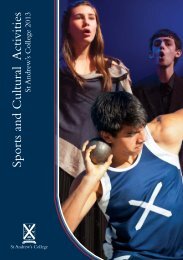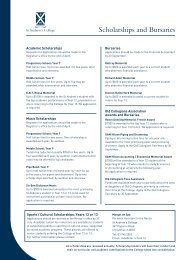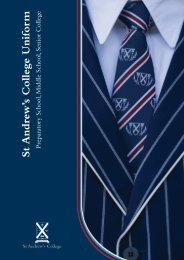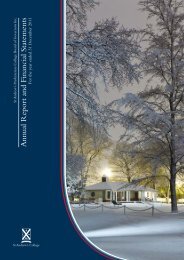Senior College Handbook - St Andrew's College
Senior College Handbook - St Andrew's College
Senior College Handbook - St Andrew's College
- No tags were found...
Create successful ePaper yourself
Turn your PDF publications into a flip-book with our unique Google optimized e-Paper software.
(g) Learningi. Attitude• <strong>St</strong>udents should view learning as an opportunityrather than a chore;• Do not give in to peer pressure against beingconscientious;• If you are unsure about a section of your classwork, or whether you are doing somethingcorrectly, ask for help.ii. Approach• Have long-term goals (e.g. career), intermediategoals (e.g. get in the top six for maths) andshort-term goals (e.g. get better than Achievedequivalent for this section or piece of work);• Be clear about the purpose of a task. Checkthat what you are doing is the best way tocomplete it successfully. If not, do somethingabout it;• Be active rather than passive. Do not expectmerely to “soak it up”;• Read thoughtfully. Effective reading is morethan merely word recognition. The mind followsthe development of what is written, checksstatements against one another and thinks ofother examples;• Adapt your strategies. Do not have one basic,inflexible way of learning such as reading overand over material for all tests. Different sorts oftests – essays, projects, reading, listening – needdifferent plans of attack;• Know your strengths and weaknesses as alearner. Are you better at visual representations(graphs, diagrams, charts) than verbal ones?• Follow good models. What do good learners youknow seem to do? Will it work for you?iii. Action• Transfer your skills and knowledge. Do notkeep what is learned in maths to maths, or artto art only, but use what you know wherever youcan;• Put together whole strategies to do the job. Forexample, when learning a new skill, carefullyobserve the fine details of how it is done, break itinto stages to make it manageable and practiseeach stage carefully. Put them all together, andhave your work checked by somebody familiarwith the skill;• Translate difficult ideas into your own terms sothat you get your own grasp of them and “own”that knowledge;• Practise what you have just learned. Do it again,and get it right the second time. Get it right oftenenough to “fix” it in your mind so that it will notbe lost;• Check yourself frequently. Find out whether ornot you understand, whether or not you have gotit right, whether the tactics you are using aregoing to do the job required or whether you needto change your strategy;• Change ineffective methods for ones that havea better chance of working and be open to newinsights and possibilities for doing it better asyou work. Always look for a better way – never besatisfied.Class Teachers and Heads of DepartmentsHeads of subject departments and class teachersare available to answer questions concerning theirsubject. Their primary task is to help studentssuccessfully negotiate the courses they areundertaking. <strong>St</strong>udents must ensure they are familiarwith the course content for each of their subjects andwith the assessment programme as explained at thestart of each course.International <strong>St</strong>udentsMrs <strong>St</strong>ephanie Brooks, Head of InternationalDepartment, assists international students to settleinto the <strong>Senior</strong> <strong>College</strong>. She also coordinates theInternational Club, an ideal forum in which newstudents can develop friendships. On the academicside, she organises ESOL/English programmesto support international students and providesinformation and resources for the IELTS, TOEFL andSAT exams needed for entry into tertiary institutionshere and overseas.Learning SupportMrs Lynda Collins and Mrs Shelley Broad coordinatethe Learning Support programme, working withindividuals and small groups of students who needlearning support. A teachers’ aide also works withstudents who require learning support within oroutside the classroom.Ms Mary McNulty organises and coordinatesextension programmes for those students whorequire them. <strong>St</strong>udents are referred to Ms McNulty byDeans and class teachers.20


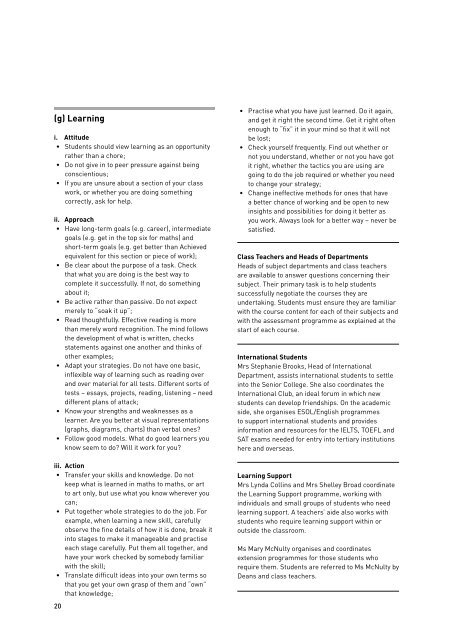
![Curriculum 2014 WEB [2 MB] - St Andrew's College](https://img.yumpu.com/50625770/1/184x260/curriculum-2014-web-2-mb-st-andrews-college.jpg?quality=85)
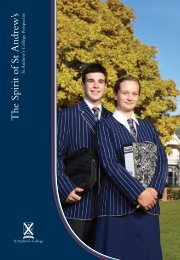
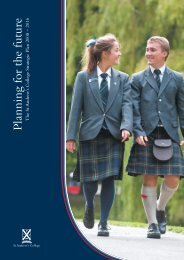
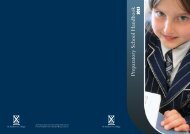
![StAC Preparatory School Annual Report 2012 [1.6 MB] - St Andrew's ...](https://img.yumpu.com/42843761/1/184x260/stac-preparatory-school-annual-report-2012-16-mb-st-andrews-.jpg?quality=85)
